Music, Wellbeing and Mental Health
An RMA, BFE and NAMHE event
at the University of York St John
12-13 May 2018
‘Music, Wellbeing and Mental Health’ was a 2-day event dedicated to the study of music for physical and mental wellbeing, as well as the health challenges encountered by music practitioners and
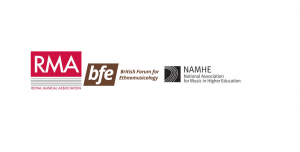
researchers. This dichotomy was repeatedly discussed and strategies for survival in academic, musical and professional environments were proposed.
The event was divided into a study day and a workshop. The Saturday featured 20-minute papers by research students early-career researchers and senior academics. The Sunday featured workshops with interactive discussion sessions and practical activities.
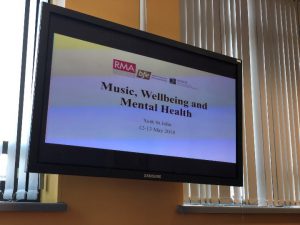
Study Day
The study day kicked off by a reflection by Núria Bonet (Royal Musical Association) on how to organise ‘better’ conferences; due to a late cancellation this paper was only scheduled the day before. Issues identified by Núria and the delegates can be summarised as follows: conferences should be affordable, accessible, sustainable and safe. Discussions arose around skype presentations, the cost of conferences, offering childcare and dealing with all types of harassment.
Liz Haddon (University of York) spoke about the mental health crisis at universities and how supervisors deal with their students’ issues. She asked what the universities’ responsibilities are in this regard and whether academics are prepared to deal with these problems. The latter are often not trained to deal with mental health issues, their schedules do not allow for the required contact time, and sometimes they are not interested in the students’ concerns. Liz explained that supervisors have a duty of care to their students and colleagues but are not therapists either; where does the support for staff come from? The paper initiated a lively discussion which carried over into later sessions.
Alexander Douglas (UCLAN) spoke on the epistemology of music. Is music just ‘auditory cheesecake’ (as suggested by Steven Pinker in How the Mind Works), a ‘product[…] of the human mind which resonate[s] with our aesthetic and emotional faculties’, effectively not necessary for human survival? Alexander argued that music must be understood as a phenomenon that is wholly other from language, which cannot be completely described by language. Therefore, expressing something musically does not necessarily mean communicating. This philosophical approach spurned a discussion on whether we should always be able to describe music within the formal context of papers and theses.
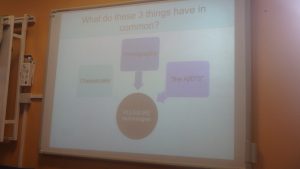
Anne-Marie Cjazkowski (University of Leeds) about her study of the effects of mindfulness on conservatoire students. She found that although instrumental practicing should be a mindful activity because of the focus on the activity at hand, it is often possible to practice without carelessly, on ‘autopilot’. For the study, dozens of students were taught a variety of mindfulness techniques and asked to report back on the effects on their life and practice. Overall, the effects positive and they reported less stress, better decision-making, better physical and aural awareness, more enjoyment, etc. Mindfulness was particularly useful for female singers who suffer from more music performance anxiety, as they could accept the anxiety, recognise thoughts and stay focused.
James Williams (University of Derby) presented the concept of ASMR (Autonomous Sensory Meridian Response) which most delegates were unfamiliar with. Rising in popularity since the end of 2016, these are videos in which the performer records sounds with close micing so that otherwise very quiet sounds are revealed (examples include tearing up a sheet of paper) or whispering. This causes a physical reaction in some listeners (skin tingling) and they often watch the videos to relax or go to sleep. While applications in a clinical setting (for anxiety, depression and insomnia) have been suggested, ASMR is still relatively unknown and might be taboo for some because of its connotations with orgasms. James’ research looks at the practice of one of his students who creates ASMR videos and is preparing ASMR pieces for a concert setting as part of her final-year portfolio.
Andrew Lansley (University of Gloucestershire) spoke about his teaching practice with autistic music students. The conditions comorbid to autism (f. ex. Anxiety, OCD, bipolar disorder) often prevent students from attending lectures and tutorials that they would want to attend. Andrew has implemented a range of changes which have proven successful in increasing the participation and learning of autistic students: a presence on Moodle and other online learning resources, lectures in video format, and choice of colour and contrast on slides which make reading easier. He wants to continue to develop these tools in his modules to best engage neuro-diverse students.
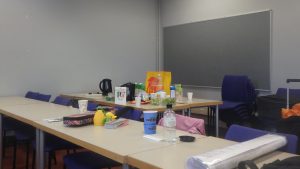
Simone Willis (Cardiff Metropolitan University) spoke on wellbeing for high-performing musicians; what constitutes it and the barriers to it. She distinguished between hedonic and eudemonic wellbeing, between happiness and fulfilment. Through a review of existing literature, she has identified occupational demands for performers which include public exposure, repertoire, competition, schedules and criticism. She has also identified well-being facilitators and barriers, which interestingly often cross over. For instance, highly skilled orchestral musicians are often the most satisfied, yet, perfectionistic tendencies are also a hindrance to wellbeing. Similarly, the professional environment is characterised by quickly changing positions, competition between colleagues and difficult schedules. These factors can both be conducive to wellbeing or lack thereof.
William Longden (London Metropolitan University) introduced us to his work with organisation Joy of Sound and his organology PhD project on building bespoke musical instruments for emancipatory arts interventions. One of his creations is a harp for a musician who sometimes throws their instrument across the room; the harp was built from carbon fibre in the shape of a ladybird (the musician’s favourite animal). William also showed one of the Joy of Sound sessions which encourages music participation for people with a diversity of abilities; the music is in the form of free-flow. Volunteers who run the sessions also benefit from helping others and being able to look away from their own issues during the session. William described inclusive music-making as a form of resilience and creativity as the ability to improvise. Finally, he made the point that conventional musical instruments are globalised and governed by international standards; therefore, conventional music making is governed and not accessible to all. Through his project, he is working to create instruments that can suit the individual’s abilities.
The final keynote was given by Ros Hawley (SOAS) and she spoke about her work with children and teenagers in hospitals. Particularly with non-verbal patients, music-making can be a way of communicating and engaging with their environment. Hospitals are noisy environments and a musical session can be a welcome sonic distraction. Ros explained the forms that the music-making might take and how the patients can interact with the musicians and potentially make music themselves. She runs a module at the RNCM in Manchester during which conservatoire students are trained to go to hospital wards with their instruments. After her talk, Ros got the delegates to make some sound themselves! After handing out a bass guitar, a melodica and various percussion instruments, everyone enthusiastically joined in with musical exercises; one involved giving musical directions with minimal body movements, for example. This activity ended the study day on a high note as delegates saw emotional videos of Ros’ work while creating connections with each other through the very same methods.
Workshop Day
Enya Doyle (Durham University) gave an energetic and engaging workshop on mental health for postgraduate students, with a particular focus on impostor syndrome. This occurs when we feel like we don’t belong in academia and might be ‘found out’ as impostors. Enya reminded us that everyone has a mental health that we need to look after and that everyone can have the feeling of being an impostor. Some solutions that she proposed are to stop comparing yourself, keeping a list of compliments and achievements about yourself, letting go of your own sense of importance (thus taking pressure off yourself), and realising that you will have good and bad days. More importantly, we need to open up the discussion within our own communities. In Durham some of the existing efforts to improve postgraduate mental health include peer-mentoring, yoga and mindfulness, going for coffee and/or pints, and a positive environment that is encouraging and challenges negative thinking. Enya’s workshop generated a lot of discussion but also concrete measures that the delegates were keen to take back to their own institutions.
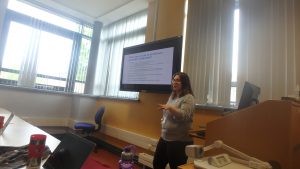
Raluca Matei (RNCM) presented thought-provoking workshop on well-being methods taught to students at conservatoires, which made an interesting argument that had delegates debating afterwards. She explained that most students will use their instrumental teacher as first point of contact for musicians’ health problems such Music Performance Anxiety, muscular-skeletal issues, eating disorders and hearing loss. However, as previously argued by Liz Haddon, teachers are often not trained to give this sort of advice. Raluca’s research looked at the health education and support programs across European conservatoires and concluded that most of them and not backed up by research. Raluca explained that while certain elements of popular methods might certainly help musicians with their issues, methods such as Feldenkrais or Alexander technique have not been proven to be beneficial by research. She argued for the implementation of support programs which have scientific evidence of success; this point generated plenty of discussion. Finally, she described a compulsory course for conservatoire students at the RNCM which teaches them about lifestyle choices, memorisation techniques, anatomy and physiology, etc. to educate them about their health. The associated assignment asks them to describe which techniques they have implemented to determine whether the course has improved their wellbeing.
Zaina Shibabi’s (Liverpool Hope University) contribution was an auto-ethnographic report on strategies for overcoming mental health issues such as depression as a research student. She reminded the delegates of the ‘Higher Education Mental Health Crisis’ with some sobering statistics, such as a recent 79% increase in student suicides and a 25% of students suffering some form of mental health problem during their degree. Some of the solutions that she offered include to be wary of comparisons with others, to take time for yourself, to make a list of what makes you happy, to join a social group, to be kind to yourself, and to reach out to others. She also asked what we could do about this crisis as a community and proposed that we should be encouraging to each other, become mentors and attend events that deal with related issues (such as this one).
The afternoon program began with a yoga and mindfulness session by Julio d’Escriván (University of Huddersfield) who led meditations that can be practiced by novices, and in an office. These types of ‘chair yoga’ exercises can help re-focus the mind and were simple enough that even I followed well! Julio also recommended some electronic resources which can assist the aspiring yogi.
The next workshop was led by members of staff and a former resident of The Retreat, a mental health care provider based in York. They introduced us to some of the songs that their patient choir enjoy singing, from the uplifting Daffodil Song to a mash-up of The Saints Come Marching In and Swing Low Sweet Chariot. Some descriptions of what the choir means to patients reminded us of the therapeutic, emotional and human potential of communal music-making. One participant stated that it made her feel ‘human’ once a week because it was not a treatment and formed a temporary community.
Finally, William Longden (Joy of Sound) offered the group an opportunity to play some of the bespoke instruments that he had described in his paper during the study day. He spoke again on the purpose of his work Joy of Sound which runs participatory music session which feature unique instruments that are adapted to the abilities of each participant. The delegates had the chance to perform in ‘free-flow’ form on a variety of instruments such as the carbon-fibre harp, an open-stringed instrument and various percussion instruments played with cut-up credit card plectra and a chopstick. During the performance, roles of rhythm, melody, singing and conducting were distributed. Again, the delegates witnessed a fascinating demonstration of community music-making as an inclusive activity.
Overall, the event was a success because of the exceptional quality of the papers and workshops. Numerous connections were made and future plans for collaboration, organisation and support were being elaborated all along.
(I would like to thank all delegates for a wonderful weekend full of ideas, music-making and respect. Let’s hope that we can repeat it bigger and better!)
Núria Bonet
RMA Research Skills Officer
